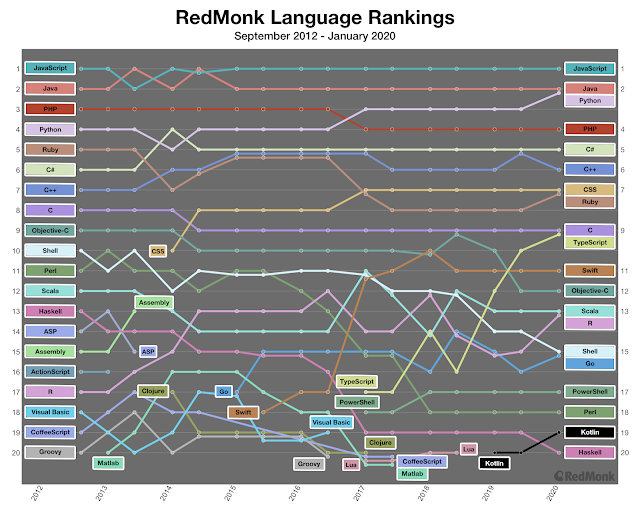Python, R and Other Programming Languages Thriving Long-Term
If you look at any programming-language rankings that analytics companies regularly publish, you know that languages at the top of those rankings rarely change in the short term. Python, JavaScript, Java and other "big" languages seem impossible to move from the top.
Whatever it is, the long-term linguistic breakdown of analyst firm Redmank is very interesting: you can see how the use of these languages increases or decreases over many years. Redmank determines long-term rankings by sourcing data through GitHub Pull Requests and Stock Overflow Negotiations. The organization describes its approach as "not to provide a statistically valid representation of current use, but to interconnect language discussion and usage in an effort to attract insight into future adoption trends"; GitHub is used to measure the amount of code generated by a particular language, while stock overflow is used to "chat" or "discuss" a language.
For the latest version of the long-term chart, it is interesting to see Python growing up with CSS, Swift and TypeScript; C, Objective-C and Scala are slightly below. However, most languages are consistent overall:
One interesting thing to note: after years of a roller-coaster ride, the R is actually ranked fourth from where it was in 2012. This runs counter to the popular narrative that suggests that R is mainly used by data scientists. Eat Python as part of their workflow. In fact, several surveys have indicated that the use of R among data and analytics professionals is declining at the expense of Python.
However, Redmank Data R represents its own niche language rather than a catchphrase. It echoes the recent results of the TIOBE index, which ranks R from 20th to eighth in their language rankings.
Python ranks second in the Redmonk rankings from data analytics to AI. Work. "The mastery of the language, unofficial and often overlooked, is the basis of her calling card and her persistent power," after reads Redmonk's analysis. "Like day in the its pearl, The Python is actually the glue for thousands of small projects by which they connected and the basis for countless individual scripts, some of which retrieve data for these rankings. From. "
As you can see from the chart, "big" languages like Python generally have not made much progress in the rankings over the last few years; It has a low ranking, where only a few thousand developers can have a significant impact on the overall use of the language, where you look very chaotic. Who knows what this list might look like five years from now, but Python is still there.









2 Comments
Thanks, very information article. to know more Online Python & R Prog bootcamp for Beginners in USA
ReplyDeletevirtual event platform Part of the problem is that event organizers haven’t embraced the power of digital networking; they simply tried to make in-person networking models fit into an online mold. event food ideas, organize an event and how to write a bio about yourself
ReplyDeleteIf you have any doubt, Please let me know.